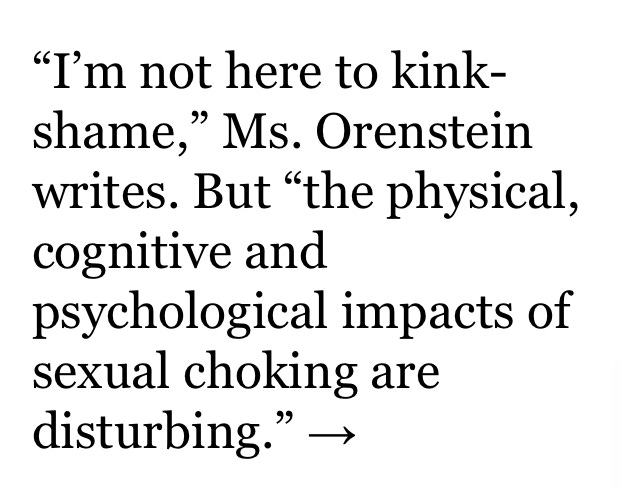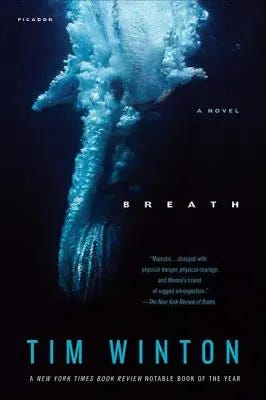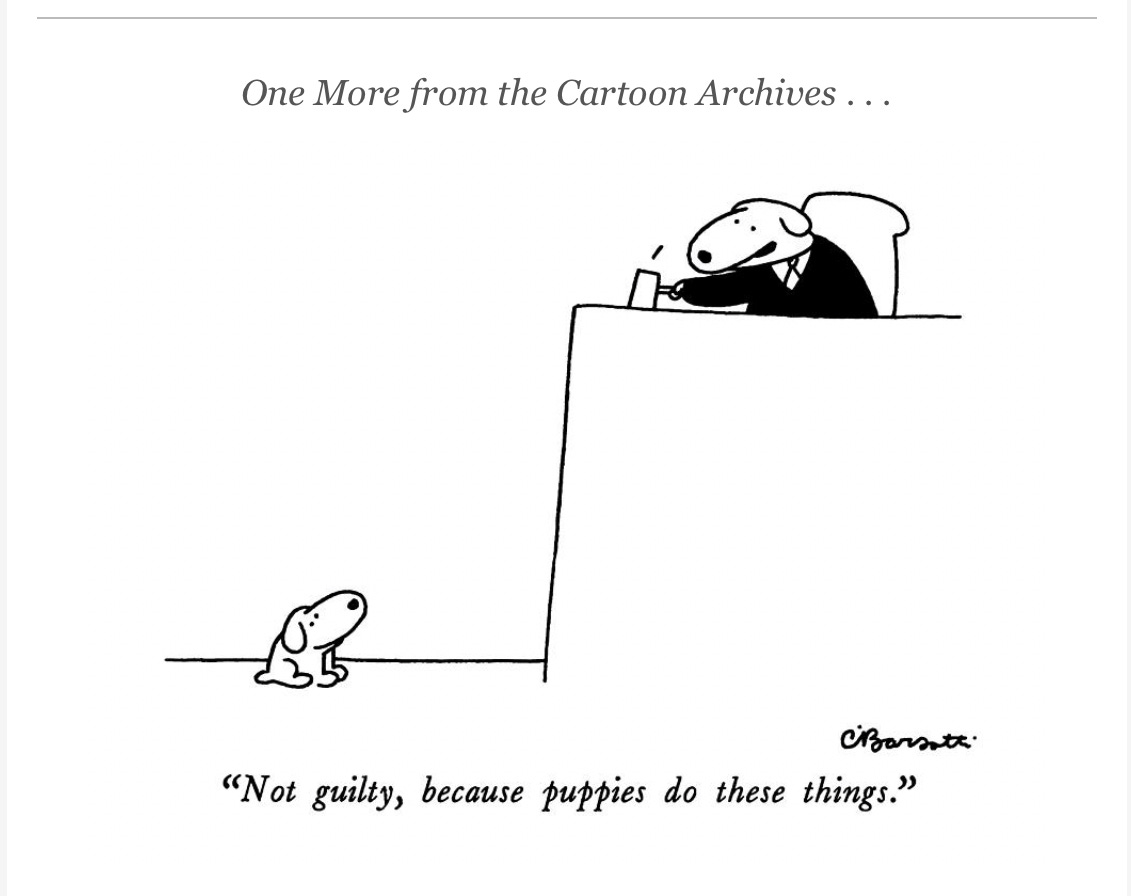Scapegoats: book blaming, library blaming, dog blaming
Library books aren’t responsible for sexual strangulation
The blame game
It’s so strange, the way librarians and library books have become the scapegoat for American society’s ills. I’d wanted to post today about what makes a good novel, and about cults and cultishness (the subject of my upcoming novel). But I found myself needing to talk about the blame game instead.
Blaming books for dangerous teen behaviors. Blaming librarians for not ‘hopping to’ fast enough when someone complains about a book. Blaming dogs for being dogs. (Kristi Noem)
All-righty, then. CW: The following includes two disturbing topics (sexual strangulation and killing pet dogs).
Everything is your librarian’s fault: sexual strangulation
This week, I read an essay by Peggy Orenstein in the NYT about sexual strangulation and the uptick in teens who report experiencing it. It made me worry about teens and the pressures they are under. I’m quoting several paragraphs below, but I encourage you to read the whole, long essay. (I have gifted it, so click on the title to get the entire essay.)
Once I read it, the first thing that occurred to me is: someone is going to say the author is being a prude and shaming people for BDSM even though it is quite clear that she is not shaming anyone. Her only concern is the safety of teens. (Note: Orenstein wrote the bestseller Girls and Sex, which I reviewed in 2016, here. She basically presents facts about teen behaviors, and, in heterosexual relationships, how they negatively affect girls. She is very much a teen advocate.)1
My second thought: I bet certain people are going to blame this on libraries/librarians. So I looked in the comments. Sure enough. Here’s the link to the full article and some quoted sections:
The Troubling Trend in Teenage Sex
Sexual strangulation, nearly always of women in heterosexual pornography, has long been a staple on free sites, those default sources of sex ed for teens. As with anything else, repeat exposure can render the once appalling appealing. It’s not uncommon for behaviors to be normalized in porn, move within a few years to mainstream media, then, in what may become a feedback loop, be adopted in the bedroom or the dorm room.
… most say that their partners never or only sometimes asked before grabbing their necks. For many, there had been moments when they couldn’t breathe or speak, compromising the ability to withdraw consent, if they’d given it. No wonder that, in a separate study by Dr. Herbenick, choking was among the most frequently listed sex acts young women said had scared them, reporting that it sometimes made them worry whether they’d survive.
Among girls and women I’ve spoken with, many did not want or like to be sexually strangled, though in an otherwise desired encounter they didn’t name it as assault. Still, a sizable number were enthusiastic; they requested it. It is exciting to feel so vulnerable, a college junior explained. The power dynamic turns her on; oxygen deprivation to the brain can trigger euphoria.
That same young woman, incidentally, had never climaxed with a partner: While the prevalence of choking has skyrocketed, rates of orgasm among young women have not increased, nor has the “orgasm gap” disappeared among heterosexual couples. “It indicates they’re not doing other things to enhance female arousal or pleasure,” Dr. Herbenick said.
Keisuke Kawata, a neuroscientist at Indiana University’s School of Public Health, was one of the first researchers to sound the alarm on how the cumulative, seemingly inconsequential, sub-concussive hits football players sustain (as opposed to the occasional hard blow) were key to triggering C.T.E., the degenerative brain disease. He’s a good judge of serious threats to the brain. In response to Dr. Herbenick’s work, he’s turning his attention to sexual strangulation. “I see a similarity” to C.T.E., he told me, “though the mechanism of injury is very different.” In this case, it is oxygen-blocking pressure to the throat, frequently in light, repeated bursts of a few seconds each.
Strangulation—sexual or otherwise—often leaves few visible marks and can be easily overlooked as a cause of death. Those whose experiences are nonlethal rarely seek medical attention, because any injuries seem minor: Young women Dr. Herbenick studied mostly reported lightheadedness, headaches, neck pain, temporary loss of coordination and ear ringing. The symptoms resolve, and all seems well. But, as with those N.F.L. players, the true effects are silent, potentially not showing up for days, weeks, even years.
According to the American Academy of Neurology, restricting blood flow to the brain, even briefly, can cause permanent injury, including stroke and cognitive impairment. In M.R.I.s conducted by Dr. Kawata and his colleagues (including Dr. Herbenick, who is a co-author of his papers on strangulation), undergraduate women who have been repeatedly choked show a reduction in cortical folding in the brain compared with a never-choked control group. They also showed widespread cortical thickening, an inflammation response that is associated with elevated risk of later-onset mental illness. In completing simple memory tasks, their brains had to work far harder than the control group, recruiting from more regions to achieve the same level of accuracy.
The hemispheres in the choked group’s brains, too, were badly skewed, with the right side hyperactive and the left underperforming. A similar imbalance is associated with mood disorders—and indeed in Dr. Herbenick’s surveys girls and women who had been choked were more likely than others (or choked men) to have experienced overwhelming anxiety, as well as sadness and loneliness, with the effect more pronounced as the incidence rose: Women who had experienced more than five instances of choking were two and a half times as likely as those who had never been choked to say they had been so depressed within the previous 30 days they couldn’t function. Whether girls and women with mental health challenges are more likely to seek out (or be subjected to) choking, choking causes mood disorders, or some combination of the two is still unclear. But hypoxia, or oxygen deprivation—judging by what research has shown about other types of traumatic brain injury—could be a contributing factor. Given the soaring rates of depression and anxiety among young women, that warrants concern.
Here are a few comments left by online readers of the article—one that blames school libraries for this; one that shows how hard it is for educators to help teens with sex education because it isn’t allowed.
You be the librarian—what do you do?
What’s a librarian to do? Teens come into the library seeking information and stories about such things. I had a book in my high school library that has a sexual strangulation reference. It was not a blockbuster, but rather pretty literary (and short). Why did I have it? I’d bought it because we had students and teachers interested in surfing. And that’s what a lot of the novel is about. Beautifully so. But underlying that general subject was the real theme: adults sometimes use kids for their own purposes, including to stroke their egos. Bad adults can press kids (particularly teens) into dangerous situations, games of chicken and more. Teens need to be aware that those adults exist.
Books like Breath matter for teens because teens are curious about things that make adults uncomfortable. They don’t ask adults about those things. They experiment with them and hope for the best. In Breath, we have a narrator who is an adult looking back at being pressed into big wave surfing as well as into a sexual tryst with an adult, two things he both wasn’t prepared for and that are life-threatening. I reviewed the book in 2012. That review is linked below, with the review following. (Again—reviews don’t give away the details that I have given away above.)
Which risks are worth it? How do you challenge yourself in a way that makes you grow as an individual? That can make you feel alive and so adrenaline-fueled that every day you’re ready and waiting for a new adventure? How do you keep from stepping over that invisible line where you are challenging death itself?
Bruce, nicknamed Pikelet as a teen, is a paramedic as an adult. As the novel opens, he has arrived on the scene of what appears to be a teen suicide, a hanging. But he knows better.
When they meet Sando, friends Pikelet and Looney don’t know that he is a big wave surfer, well-known in some places and sometimes appearing in surf magazines. They are Australian boys who have recently discovered the sport. They’d always enjoyed the water and holding their breath at the bottom of the river. But the ocean is something different. They love it and will do whatever it takes to have the chance to ride waves. They take up odd jobs in order to buy equipment. Looney’s father is neglectful and abusive, so Looney can go out anytime without much trouble. But Pikelet must lie to his older, concerned folks in order to get away and challenge the waves since his father fears the ocean for reasons he keeps secret.
Sando decides to mentor the boys in surfing bigger and more dangerous waves. They are flattered by his attention, and learn that they have to ignore the snide comments Sando’s wife, Eva, makes about them and their relationship to Sando. She understands that they are there, at least in part, to feed his ego.
Eva has a limp. Yet why she limps and why she is so angry is a secret—and uncovering it is dangerous for Pikelet. As she opens herself up to him, he finds himself trapped by her adult yearnings. While he intuits how inappropriate she is in taking him into her confidence, Pikelet is also smitten with her.
Loonie is aptly named. He will try anything and for him, death-defying challenges are a way to show that he is better than Pikelet, more of a man. But Pikelet has a better sense of self-preservation. He loves a challenge, but knows when his chances of survival aren’t so good.
This slender book is so beautifully written, such a wonder. I was hungrily reading it, hoping to recommend it to all teens. As I got to the final pages, and read about Eva and her way of recreating danger and the adrenaline-stoked high of the fear that accompanies it, I knew that Breath is for mature teens only. Yet it deals so well with the questions of an ordinary life, of facing challenges, and even of maintaining breath, I couldn’t help but hope that others will have the chance to enjoy it.
One of the advantages of having an adult book with an adult narrator is that the person can look back on the teen years with a clear-eyed view of what was really happening. A teen might find all the danger very cool. The adult understands he was being taken advantage of. That he didn’t deserve any of the danger he was put in. And knowing this lesson, he can pass it along to the teen reader.
Way back, decades ago, a young man in the city where I lived killed his wife by sexual strangulation. They were newlyweds and both active members of their church. (I believe he was a deacon, but I might be remembering wrong.) He hadn’t quickly called for help as his wife died. As I recall, he said that she looked gross. He was not prosecuted because the sex was consensual, but the story stuck with me both because his pastor backed him, saying this was a terrible accident, and his wife’s parents couldn't understand how their daughter would receive no justice. Haunted, I fictionalized the tale and incorporated it into “Signage,” one of the stories in my collection Acts of Contrition.
I mention this as an example showing that young people of all stripes experiment. Reading is a safe way to imagine experiments, to envision the end result of dangerous behavior. I much prefer this for teens. Let’s allow them to safely delve into their curiosity. In the library. So, yeah. After I read the entire book, I kept it in the library.
Dogs
I’ve no doubt everyone who reads this is familiar with last week’s story about Kristi Noem killing her dog (and then, for good measure, her goat) as well as the circumstances surrounding those killings. This has made everyone I know sad. Because everyone I know loves dogs. Noem’s dog was fourteen months old. When my dogs were that age and I was having a hard time with their behavior, my sister in-law, who was once a veterinarian tech, reminded me that they were ‘teenagers.’ Experimenting. Too bad Noem couldn’t have thought of it that way.
In light of Noem’s story, I thought you’d enjoy the following two articles, available through the links. The first is satire. The second: I thought you’d love the idea that dogs have molded people as much as people have molded dogs.
‘Kristi, darling, I understand completely,’ by Cruella De Vil by Alexandra Petri (satirist).
Dogs are our greatest creation. And we might be theirs.
Around the time early humans evolved, Neanderthals also walked the planet. At some point — roughly 40,000 years ago — humans started to thrive while Neanderthals died off. And this is about the time when those first curious wolves began to evolve into dogs. Some scientists believe the timing is not a coincidence. Maybe the dog was the key advantage in the triumph of humankind.
Dogs enabled humans to settle down and stop their endless wandering. Dogs protected humans at this vulnerable transition from nomadic to settled life. Dogs did work that humans did not have the strength or stamina to do: guarding, herding, hunting, pulling sleds. They created time for humans to build and think and create without having to focus every moment on the next meal or the next threat.
We domesticated dogs, and they domesticated us.
Some dog happiness for you!
My rescue dogs have their moments and we roll with it. They are littermates. I was told that might make them extra protective of one another. Curiosa apparently understands how to give other dogs the evil eye (Do you know if this is possible?), so periodically a dog will start barking at her and sometimes leap at her to the end of its leash. (Dogs don’t do this to Loki.) Because of this, if no one in my family is around to walk the dogs with me, I walk them separately so I can be in control. Yeah, it’s a bit inconvenient, but that’s life. It’s worth it.
When I promised to bring you dogs periodically, I figured you wanted the happy stuff, so here’s Curiosa, the busybody.
And Loki, stopping to smell—and contemplate—the flowers.
Book news
I’m curating the book challenge news. These are stories I found important.
Let’s start with some positive stories.
A reader pointed out to me that Ruby Bridges was interviewed on Meet the Press last Sunday, the day I linked to Bridges’ comments on her book being banned. Such a lovely interview! (Thanks, Christine!) NB: Bridges gives props to her teacher. All teachers will love to see this interview.
Here's a positive read from the LA Times, both interesting, and heartwarming despite the topic
Surprises in a Trans Author’s Red-State Library Tour. Supporting freedom to read was freeing to her.
Mychal Threets has become ‘internet famous’ through social media, but if you don’t know him this article is a nice introduction that will make you smile :
How a librarian became a social media sensation spreading a message of love and literacy
'Freedom to Learn' protesters push back on book bans, restrictions on Black history
WASHINGTON, DC —National civil rights leaders and other activists, including college students, rallied outside the U.S. Supreme Court Friday to push back against efforts to ban some books and restrict lessons about Black history and other social issues.
The effort is part of the “Freedom to Learn” campaign, a national movement to combat those restrictions and what activists call misinformation about Black history and critical race theory. Organizers tout the rally as a day of action.
Are Florida's book removals in schools protected government speech? Judge is not convinced
The legal drama centers on the removal of "And Tango Makes Three," a children's book, based on a true story, about two male penguins that raise a chick together.
Last week, I linked to the story of a Girl Scout being censored while receiving recognition for her Gold Award achievement (the highest in Girl Scouting). Her response and the counter-response is classic.
"Gold Award" Girl Scout Claps Back At School Board For Censoring Her Project
Girl Scout Kate Lindley’s “Gold Award” — the highest award given to Girl Scouts — was given to her to recognize the work she’s done to fight book banning in her community. But the Hanover Board of Supervisors, which has a history of “de-selecting” books, took all mention of book banning out of her personal statement when honoring the four girls who completed projects this year.
Four different girls received a Gold Award this year, but when the school board read about each girl’s accomplishments, Lindley’s self-submitted description was altered to take out all mention of banned books.
In a public comment session after the incident, the community rallied around Lindley. Lindley herself also spoke out during the public comment.
“You bestowed upon me the greatest honor you could. Greater than that of any proclamation in your censorship of my Gold Award project," she said. “You have shown the world that you are afraid to call something what it is, be that a banned book or a ‘de-selected’ one.”
Cold Harbor District Supervisor Michael Herzberg, who has been involved in the book banning measures and who voted to remove the book banning language from Lindley’s award recognition, also spoke during the public comments.
“If anyone wants to support an author whose message is about pornography to children then people have the right to do that," Herzberg said. "As a board member, I have a right to say no that I don’t support that request and I also have the right to say yes I have the right to approve the substitute request so the Girl Scout could still get recognized for her Gold Award."
On a sadder front:
“He called me and the teen librarian ‘pedophiles and groomers,’” one library director said in an interview. “That’s definitely language that, until the last couple of years, we really had never encountered in any kind of pushback about library materials.”
I’ve included other iterations of the following info, but I don’t think those articles had the seven-day deadline in them.
Alabama Librarians Could Face Jail Under New Book Ban Bill
Alabama librarians are speaking out about a bill that could put them in jail for up to a year if they don’t remove books considered obscene by some within seven days. AL.com reports that the state House has passed the legislation—which is backed by Moms for Liberty—and it’s headed to the Senate. “The writing on the wall couldn’t be clearer regarding the chilling effect this law would have on statewide employment, public library and school funding, public education outcomes, quality of life, First Amendment rights, and countless other metrics,” Alyx Kim-Yohn, circulation manager at Huntsville-Madison Public Library, told the site.
Are Librarians Criminals? These Bills Would Make Them So: Book Censorship News, May 3, 2024
Another in the ‘You Can’t Make This Up’ Department:
Spartanburg Co. [SC]school district removes dozens of books under strict new content policy
Among the titles that appear to have been removed from Chapman and Landrum high school libraries are “The Perks of Being a Wallflower,” “The Handmaid’s Tale” and Kurt Vonnegut’s classic novel “Slaughterhouse-Five.”
Remaining in the district’s libraries are literature guides and critical praise that discuss those titles.
“So you can go into the library and read why it’s an important book but you can’t actually access the book itself,” said Tessie Holliday of Free to Read Spartanburg County, an advocacy group that’s been critical of the new policy.
His Book Was Repeatedly Banned. Fighting For It Shaped His Life.
“The Chocolate War,” published 50 years ago, became one of the country’s most challenged books. Its author, Robert Cormier, spent years fighting attempts to ban it — like many authors today. (P.S.—this is a great book to book talk to teens.)
The Chocolate War: A high school freshman discovers the devastating consequences of refusing to join in the school’s annual fund raising drive and arousing the wrath of the school bullies. (Publisher’s description)
What I’m Reading
I saw that Fr. Gregory Boyle received the Presidential Medal of Freedom. That made me happy—his mission is so wonderful (dare I say Christ-centered?) He’s the Jesuit Catholic priest who founded Homeboy Industries, a gang-intervention and rehabilitation program based in California. During his remarks, Biden said Boyle’s “service as a Jesuit priest over four decades reminds us of the power of redemption, rehabilitation, and our obligation to those who have been condemned or counted out.”
I reviewed Boyle’s Tattoos on the Heart: The Power of Boundless Compassion back in 2010 for ‘character month.’ If you want to see compassion in action, read this or Boyle’s other books.
The Vulnerables by Sigrid Nunez
From Ash to Ashes by Krishna Tuli Arora (YA book, small publisher)
Chapbooks from Bamboo Dart Press (publisher of my chapbook The Mortality of Dogs and Humans)
What I’m watching
Still enjoying A Gentleman in Moscow
God & Country
Big Love—because I ever saw any of it when it was current (I pretty much didn’t watch TV for thirty years, but that's a story for another time). I wanted to see any connections between my upcoming novel on a teen escaping a polygamist cult and this show.
What are your thoughts?
From my 2016 review of Girls and Sex: “Honestly, it made liberal-hearted me a bit squeamish as it covered all the bases: hook-up culture in both high school and college, including the demand on girls that they give guys whom they don’t even know blow jobs (because the current generation of teens has a mantra that this isn’t real sex)—and the need for these girls to get pretty drunk in order to allow themselves to think this was OK/normal; the culture of ‘purity pledges’ that has come as a backlash (and the research that shows that the purity pledges don’t work/that teens who take them are more likely to get pregnant than those who don’t); date rape; rape on college campuses; binge drinking and rape; sexist images and stereotyping of female bodies; pornography that degrades and objectifies women as one of the only sex education tools that teens use because they are getting ‘abstinence only’ education at school; the negative to disastrous sexual encounters that result from ‘porn-ed’ and’ abstinence-only-ed’ (painful, humiliating sexual encounters modeled after porn and tens of millions of dollars of taxpayer money poured into abstinence with virtually no resulting decline in teen sex); the bizarre and very public tightrope walk girls must take between frigid prude and social-media-shamed slut.”














It's all getting weirder and weirder for young people. Is it me or is the pressure to conform much greater than ever?
Enjoyed this! Thank you for writing, Victoria!
It's so disturbing how book banning and attacks against librarians and libraries are increasing rapidly. Not looking good for freedom in general.